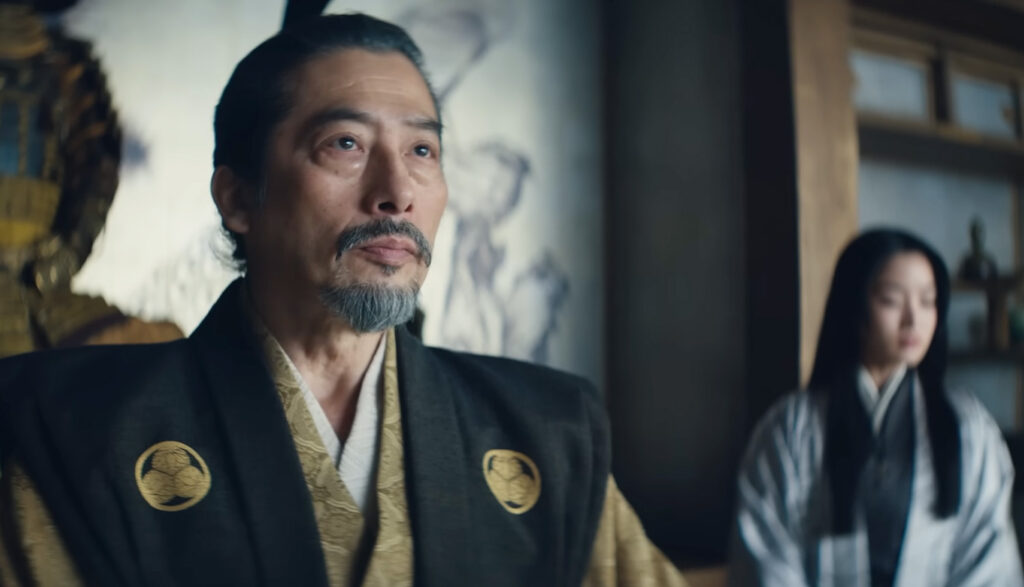
Shogun S1E2: Servants of Two Masters
Episode one of Shogun made it clear that Japanese politics are complicated, and the English sailor who blundered into them is in well over his head. So episode two is all about exposition, to catch us up on the various parties involved and what’s at stake.
We start with a flashback to the Taiko (the previous ruler) on his deathbed, with Toranaga close at hand. He asks Toranaga to be regent until Prince Yaechiyo comes of age, knowing that “the vultures are circling,” and that his young son would be vulnerable on the throne. But Toranaga declines. He knows that would put a gigantic target on his back for those same vultures. So instead, he accepts the power-sharing agreement with his four rivals, and promises to watch over the young prince.
We might get more backstory down the line, but that’s really all we need. Toranaga is a loyal, principled man, who’s smart enough to see a few moves ahead. Except all he ended up doing was buy himself a year, and now the vultures have him surrounded.
In the present (by which we mean 1600, a year after the flashback), Toranaga summons Blackthorne, the English pirate who thus far has spent his time in Japan yelling at people in English. The Portuguese send Martín, a Jesuit priest, to translate, although Toranaga also has Mariko (whom the Jesuit calls “Lady Maria”) on hand to “practice her Portuguese.” Blackthorne, true to form, begins by insulting Martín and assuming he’ll twist his words in translation. He doesn’t, (which Mariko confirms), but less out of altruism than a secure belief that the abrasive pirate will surely hang himself given a chance.
Shockingly, given all of his previous behavior, he doesn’t. After one arrogant encounter after another, he’s humble before Toranaga. We complained last week about the show confusingly letting the Japanese characters speak their own language, but having the Portuguese character speak English. But they make a choice here that works far better — after a few exchanges through the translator, they let Toranaga and Blackthorne speak face-to-face as they take each other’s measure. We know their words are being translated, we don’t need to hear the repetition.
They’re interrupted by Ishido, Toranaga’s chief rival, come to see the barbarian. He warns Toranaga that his days are numbered, and not to waste them on this outsider. So Blackthorne’s sent back to his jail cell, and of course he tries to argue in Portuguese with his Japanese-speaking captors.
Next we meet Mariko’s family; a sweet child of about ten, a stern husband who disapproves of her working for Toranaga (or doing anything outside the home), and a sterner father-in-law, who summons her back to Toranaga’s court before her husband can object.
This is a more informal meeting, with Toranaga’s wife cracking wry jokes to Mariko and two other young women, one of whom is pregnant with Toranaga’s child. More wives? Mistresses? It’s not clear yet, but there’s no trace of animosity between the women. Toranaga values Mariko’s insight into their blue-eyed guest, and we see why: she realizes what her father-in-law doesn’t grasp, which is that Toranaga’s interested in Blackthorne because he can sow division between the rival lords, who are otherwise primed to impeach and then murder Toranaga. Two of them have been converted to Christianity by the Portuguese. Ishido has not. Infighting over the Englishman’s fate might drive enough of a wedge between Toranaga’s rivals that they might not unite against him. It’s a thin hope, but trapped in Ishido’s castle, outnumbered by the vultures, it’s the only hope he has.
In prison, Blackthorne meets another Portuguese priest, an elderly man whose flock has been jailed and sentenced to death for reasons that are unclear. He warns Blackthorne that he’s in over his head: “You don’t know their games.” He explains the rivalry between Toranaga and his rivals. In his opinion, Toranaga is doomed, and any association with him is suicide.
The priest also gives some very helpful exposition. The Church isn’t in Japan to save souls; they came to open up the country to trade. A lot of that trade in fact comes from China — China and Japan hate each other, but don’t object to trading through an intermediary. And the Portuguese manage it all from a secret base in Macao, a Portuguese enclave in China. (Britain would set up their own enclave across the harbor in Hong Kong, 240 years later).
Blackthorne thinks he can parlay this information for his freedom, and the priest only laughs. “You don’t know me,” the Englishman sneers. “I’ve known a thousand of you,” comes the priest’s weary reply. And that begs the question — why is Blackthorne so important? We know he must be, because he’s one of the lead characters. But thus far he’s spent most of his time cursing and yelling at people until they throw him in jail.
Yes, he sailed on a ship laden with canon. But those were seized as soon as he hit shore, and surely the Japanese can figure out how to fire the canon without his help. It starts to look like our white insert character doesn’t have much reason to exist beyond that, until a third act that explains
Yabushige, Toranaga’s lieutenant we met last week boiling a man alive, is visited by Ishido, and they mostly discuss the barbarian. Yabushige suggests that Toranaga is interested in the Blackthorne because he’s a European who — like Toranaga — hates the Portuguese and Catholicism. The Catholics have amassed too much power, and even if Ishido gets Toranaga out of the way, two of his three remaining rivals are Catholic, and united, they’d overpower Ishido. He also sees Blackthorne as a way to gain advantage, although how isn’t clear.
So Blackthorne is granted his freedom, again, and enlisted to help a faction in Japan’s looming civil war, again. And some violence that punctuates an episode that’s mostly talking may have just pushed us further down that road to war.
Stray thoughts:
• The Taiko’s deathbed advice to his son: “The man who stands at the tallest height is the loneliest man in the realm.”
• “Two baths in a week? Do you want me to catch the flux?”
